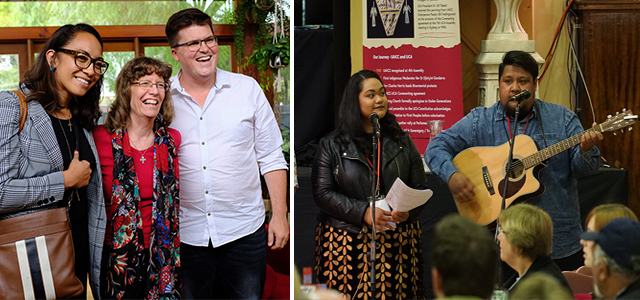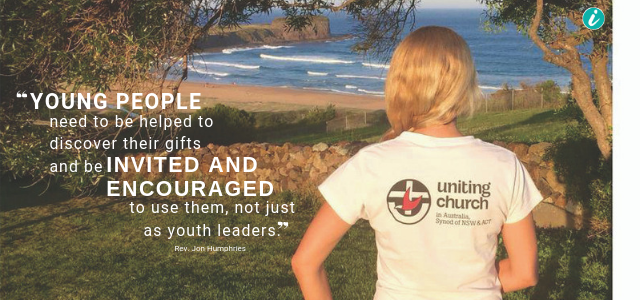Insights spoke to a cross section of people about what younger people like about their church, what they find challenging, and what keeps them involved.
Like any generation before it, Generation Y is a diverse cohort of people and, within the Uniting Church, there are bound to be a variety of reasons as to why someone gets involved…and stays.
Rev. Dr Christine Gapes is a Uniting Church Chaplain at Western Sydney University and has worked with younger people over more than twenty years. She said that while, “Young people go to church for many different reasons but a sense of belonging and purpose are still critical.”
Daniel Gibb is the Children’s, Youth, and Young Adults Ministry worker at St Matthew’s Uniting Church in Baulkham Hills. He said that the community of people at his church had largely been responsible for why he stayed there.
According to Mr Gibb, the sense of community developed through road trips to Narromine and Bourke that changed the youth group, bringing the older young adults and the youth into a more cohesive community. These trips, he said, had a purpose and provided meaning for many in the group, as they developed their faith through sharing faith stories, Bible study, and giving back to the community. The trips also provided shared experiences that bound the group together in shared stories, difficult situations, and wonderful times.
Brenda Latunipulu is another person who highlights her church community as the major reason that she has stayed.
“I went to church because it was expected of me as part of my Tongan culture,” she recalled.
“When I went to university and encountered so many different views, I made a choice to continue going to church because it helped me with my faith.”
“Church also provides a community where I am with others who are also in the same boat and through fellowship there is support to strengthen my faith in Christ. Church is also an opportunity for me to utilise my personal strengths by taking leadership roles, this allowed me to grow and challenge my faith in Christ.”

Liam Miller is the Northern Hub Mission Resource Worker for the Sydney Central Coast Presbytery and a ministry candidate. He said that, “It seems that if you decide to stay in the [Uniting Church], it’s because you really believe in what it is on about, and that you have about as much hope in it as Christ does.”
“I am kept by a church that (at its best) wants to keep moving,” Mr Miller said.
“It’s possibly clichéd to point to the choice of Uniting as the descriptor of the church, or to the Basis’ wording of Pilgrim, but at their heart they get to the missionary nature of the church, which is following a God on the move; open the movement of the Spirit on our hearts and in our world.
“The UCA has, built into its founding documents and name, openness to the future of God who calls us and sustains us as we venture forth from safety and nostalgia into a world
of possibilities.”
“I…could not be a part of a church where women and LGBTIQ+ Christians are closed off from leadership,” Mr Miller added.
Rev. James Aaron is Minister of the Word at North Ryde Community Church. In a similar vein to Mr Miller, he said that the Uniting Church’s status as a relatively young church itself appealed to young people, as this can mean that it is relatively open to change.
“I think that the Uniting Church is in an excitingly different position to many others,” Rev. Aaron said.
This, he said, was because the church combined “the joy of our traditions… with the expression of a fairly young church, and with the acknowledgment that we are a pilgrim people.”
“We can often be moving toward service and justice, with an informed tradition, but not always with the baggage and weight of it.”
Rev. Jon Humphries, Chaplain at Ravenswood School for Girls says that it’s how we get young people involved that is important.
“In the Uniting Church, all people have gifts by the Spirit and there is no gift without its corresponding service,” he said.
“So, young people need to be helped discover their gifts and be invited and encouraged to use them, not just as youth leaders.”
“If you want them to be a part of Church and a key part of Church is your worship service, then get them leading worship and praying and preaching, but encourage them to do it in ways which honour the tradition, but also express their own style and culture.”
Rev. Humphries sees an important part of their involvement should be in organising, planning and leading activities and initiatives, especially around social justice and community involvement.
Challenges ahead
The young people Insights spoke to identified a number of things that they found challenging about the Uniting Church.
Suzanah Cornford is currently studying for the HSC. She previously worked as an Insights intern. Ms Cornford told Insights that she found that the challenge was, “Basically the same as being a young person anywhere else, feeling like people won’t appreciate my input just because I’m younger than them.”
How Can We Help You?
So how can the Uniting Church help young people and encourage them to stay a part of the church’s life? Those who Insights spoke to nominated a number of areas.
Ms Cornford pointed to a number of practical areas where the church can use its resources to help.
These included: “Giving easy access to different organisations which can help teenagers. Places to go or resources to use if young people are struggling with mental health, stress, sexuality, stuff like that. And listening to younger people when they voice their problems, not being biased or close minded when serious topics are being brought up.”
It’s a point that Rev. Aaron is inclined to take up.
“When the church becomes a museum, or somewhere where you visit your faith people are not drawn into the present and living experience of God,” he said.
“The church’s challenge I think, is to continue living in the newness of God, which doesn’t always necessarily mean changing everything, but it might mean inviting young people, who all have different answers to provide their opinions and then to respectfully respond.”
Rev. Humphries said it is all about the invitation.
“Welcome is something that we need to revisit in the Church,” he said.
“Welcoming is more than just giving a warm greeting. It is about exercising hospitality. It is about valuing the other and your connection with them, not only in words, but in real tangible and practical ways. So, if you answered the questions above about welcome by suggesting that you would engage in hospitality, then you have part of the keys to welcoming and involving young people in Church.”
Rev. Humphries also points out that young people are extremely relational and that they need to feel valued by their family and community.
Josh Wyatt worships at North Ryde Community Church and is undertaking a Period of Discernment, supervised by Rev. Aaron and Rev. Raymond Joso. He told Insights that the experience has allowed him, “To have deep conversations trying to understand my purpose, my gifts, and how I can use my gifts to encourage others to seek God and find their calling.”
“If we want to engage young people, we may need to prioritise young people,” he said.
“Making this our mission could result relationships being formed, creating channels for young proactive leadership to be in our church.”

Rev. Dr Gapes says that churches that were intentional about how they fostered welcoming communities had a better chance of retaining younger members.
“They find a community where they belong and where they can also laugh and have fun. These communities don’t just happen. They need to be developed, encouraged, supported and framed,” she said.
Mr Wyatt suggested that churches would do well to reach out to younger people using the media that they are likely to engage with.
“What may have encouraged previous generations to be involved in the church may not be the best way to engage the generations of today. The secret ingredient to engaging young people could be in communicating a timeless message in a timely manner,” he said.
“If it seems that the emerging generations are captivated more by the likes of Facebook, YouTube, Instagram, Twitter, WhatsApp, and Podcasts, then the church may want to consider investing in these mediums so that the hope of Christ can be heard in a new context.
This, he says does not mean merely, “Live-streaming our Sunday morning experience on Facebook to tick the “social media” box but rather finding ways to be true storytellers, sharing the hope of Christ in a language and style which resonates and engages with young people.”
Pictures: Discipling young people in a University context is the work of Christian Students Uniting
Thanks to Christine Gapes for additional interviewing and reporting.
Jonathan Foye is Insights’ Editor














